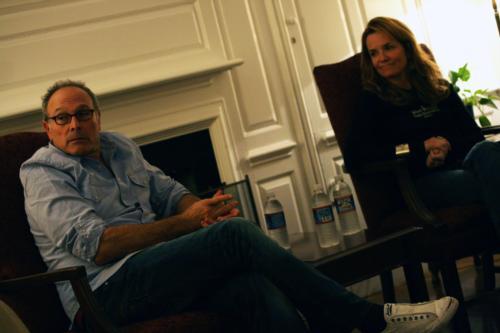
News
Harvard Quietly Resolves Anti-Palestinian Discrimination Complaint With Ed. Department

News
Following Dining Hall Crowds, Harvard College Won’t Say Whether It Tracked Wintersession Move-Ins

News
Harvard Outsources Program to Identify Descendants of Those Enslaved by University Affiliates, Lays Off Internal Staff

News
Harvard Medical School Cancels Class Session With Gazan Patients, Calling It One-Sided

News
Garber Privately Tells Faculty That Harvard Must Rethink Messaging After GOP Victory
Talking Love and Film at Kirkland

Had things went the way he thought they would, director Howard Deutch would be working in advertising and the 1986 cult classic “Pretty in Pink” would never have been made. Had things worked out the way she pictured, Lea Thompson would have pursued a dancing career, not the role of mother-turned-heartthrob Lorraine Baines McFly in 1985’s “Back to the Future.”
Generations X-ers and ’80s fans must be glad things didn’t work out as planned.
Husband-and-wife team Deutch and Thompson discussed how they fell into their careers, Hollywood, and love as part of the “Conversations with Kirkland” series, led by Scholar in Residence Peter Emerson, KSG ’02. Emerson founded “Conversations with Kirkland” in 2002. The student-run program brings eminent personalities from diverse fields to talk with Harvard students.
And the conversations are intimate. There were no more than 15 people in the room last Sunday, Oct. 21, when Deutch and Thompson spoke. Marielle E. Woods ’08, one of the student organizers, noted that such numbers are actually ideal for the kind of dialogue the series is meant to foster.
“It’s not an interview. It’s not a speech. It’s a conversation,” she said.
Deutch and Thompson used the format to share several anecdotes about their experiences in the movies, starting with the one that brought them together. Now married for over 20 years, the two met on the set of 1987’s “Some Kind of Wonderful.”
“She was great to direct,” said Deutch, “compared to the others.”
“Everyone knew Howie had a crush on me,” said Thompson.
Though the pair came prepared to give advice to students trying to break into the film industry, most wanted to learn about Deutch’s directorial debut “Pretty in Pink” and Thompson’s star-making turn in “Back to the Future.”
Commenting on his film’s success, Deutch paraphrased director Sidney Lumet. “‘When I was doing movies in the fifties, I didn’t know it was the Golden Age of movies,’” said Deutch, quoting Lumet.
“That’s what it was like with ‘Pretty in Pink,’” he continued. “I didn’t know it was going to be an iconic coming-of-age movie.”
According to Deutch, Molly Ringwald, a diva whose behavior almost prevented her from getting the star role, occupied too much of his time.
“Mollie had a little taste of fame already. She was a bit of a handful,” he explained, adding that the studio was not partial to Ringwald.
“They wanted the girl from ‘Flashdance,’” he said.
Deutch fought for Ringwald.
“I groveled a bit to a sixteen-year-old,” he said, adding that the decision paid off.
Thompson shared a similar story. According to her, Michael J. Fox replaced the original actor for the part of Marty McFly, who was fired six weeks into shooting.
Like Fox, Thompson also caught a lucky break. She discussed her origins as a dancer, noting that she only stumbled onto acting when her ballet company owed a theatre company money. She was sent as payment.
“They traded me like a ho to be in this play,” she said. “I accidentally fell into this other thing—acting—and then I had way more success, both artistically and financially than I ever thought...I never thought I would make more than 75 dollars a week.”
Deutch began his career working in advertising for the film company United Artists. After a stint of unemployment, he went into making film trailers—including the now-famous preview for Francis Ford Coppola’s “Apocalypse Now”—instead. The camera work fostered his love of directing.
According to Deutch, that love might be harder to pursue for a young artist today.
“You can be the most brilliant new artist, and one movie tanks, and you can’t even get a meeting,” Deutch said.
“What amazes me is that people are still trying,” Thompson added.
The two disagreed, however, over the benefits of changes in the film industry.
“With YouTube and all that craziness going on, there’s an opportunity for young people to get in,” Thompson said. “Before, it used to be a more close-knit club, because so little was getting made.”
“I always like to look for the hopeful parts,” the self-proclaimed optimist said.
“I like to look at the more hopeless parts,” Deutch responded dryly.
He pointed to studios’ growing reliance on the bottom line, which he said caused them to overlook seminal films in favor of blockbusters.
He said of the climate when he started directing, “If you made a cool movie, you had a career. The Friday night it opened was not about how much money it made, it was about what the reviews were, whether it was going to be the talk of the town.”
“I can’t agree with you,” said Thompson. “I still think there’s this total room for creativity and insanity.”
Deutch responded with trademark wit.
“We’re going to get divorced, by the way.”
—Staff writer Candace I. Munroe can be reached at cimunroe@fas.harvard.edu.
Want to keep up with breaking news? Subscribe to our email newsletter.
